英语 作文 数学 教学反思
教学反思常用模板英语作文

教学反思常用模板英语作文英文回答:Lesson reflection is an important tool for teachers to improve their teaching practice. It allows them to identify what worked well in a lesson, what could be improved, and what students learned. There are many different lesson reflection templates that teachers can use, but they all typically include some common elements, such as:A description of the lesson。
An analysis of what worked well and what could be improved。
A reflection on what students learned。
A plan for how to improve the lesson in the future。
Lesson reflection templates can be helpful for teachersbecause they provide a structured way to reflect on their teaching practice. They can also help teachers to identify patterns in their teaching and to develop strategies for improving their instruction.中文回答:教学反思是教师改进其教学实践的重要工具。
它使教师能够确定一节课中什么内容学得很好,哪些内容需要改进,以及学生学到了什么。
教学反思英文作文小学
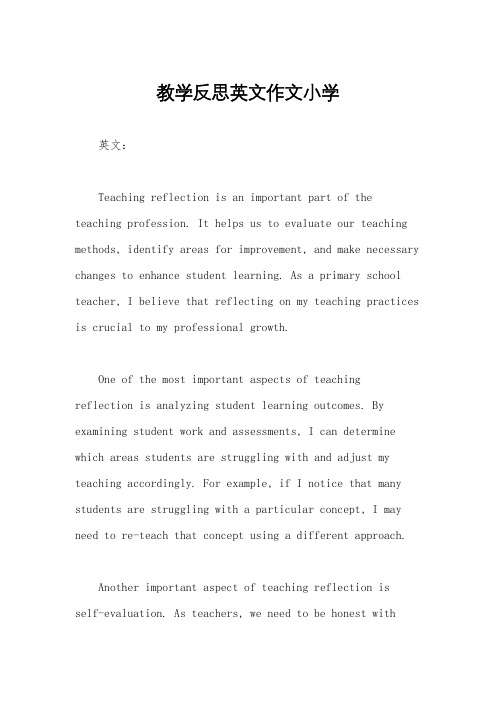
教学反思英文作文小学英文:Teaching reflection is an important part of the teaching profession. It helps us to evaluate our teaching methods, identify areas for improvement, and make necessary changes to enhance student learning. As a primary school teacher, I believe that reflecting on my teaching practices is crucial to my professional growth.One of the most important aspects of teachingreflection is analyzing student learning outcomes. By examining student work and assessments, I can determine which areas students are struggling with and adjust my teaching accordingly. For example, if I notice that many students are struggling with a particular concept, I may need to re-teach that concept using a different approach.Another important aspect of teaching reflection isself-evaluation. As teachers, we need to be honest withourselves about our strengths and weaknesses. By reflecting on our teaching practices, we can identify areas where we excel and areas where we need improvement. For example, if I notice that I tend to lecture too much during class, I may need to incorporate more hands-on activities to engage my students.In addition, teaching reflection allows us to learn from our mistakes. It is important to acknowledge when something didn't work and make changes to improve. For example, if I tried a new teaching strategy that didn't work as well as I had hoped, I can reflect on why it didn't work and make adjustments for the future.Overall, teaching reflection is a valuable tool for all teachers. By analyzing student learning outcomes, self-evaluating, and learning from our mistakes, we can improve our teaching practices and enhance student learning.中文:教学反思是教育工作者职业生涯中的重要组成部分。
英语写作教学反思8篇
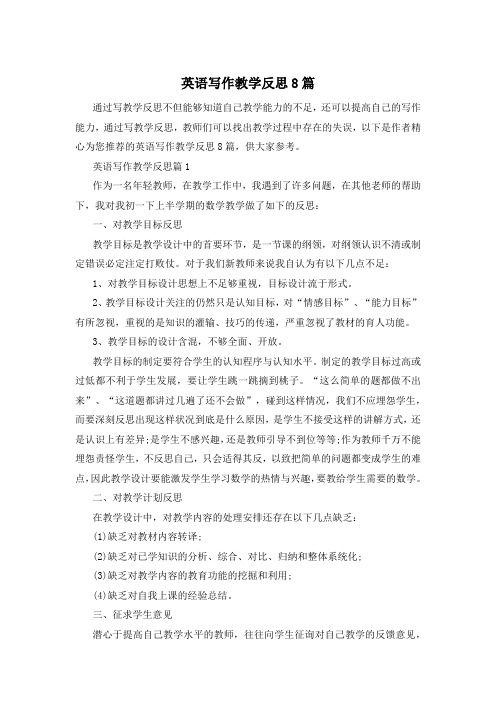
英语写作教学反思8篇通过写教学反思不但能够知道自己教学能力的不足,还可以提高自己的写作能力,通过写教学反思,教师们可以找出教学过程中存在的失误,以下是作者精心为您推荐的英语写作教学反思8篇,供大家参考。
英语写作教学反思篇1作为一名年轻教师,在教学工作中,我遇到了许多问题,在其他老师的帮助下,我对我初一下上半学期的数学教学做了如下的反思:一、对教学目标反思教学目标是教学设计中的首要环节,是一节课的纲领,对纲领认识不清或制定错误必定注定打败仗。
对于我们新教师来说我自认为有以下几点不足:1、对教学目标设计思想上不足够重视,目标设计流于形式。
2、教学目标设计关注的仍然只是认知目标,对“情感目标”、“能力目标”有所忽视,重视的是知识的灌输、技巧的传递,严重忽视了教材的育人功能。
3、教学目标的设计含混,不够全面、开放。
教学目标的制定要符合学生的认知程序与认知水平。
制定的教学目标过高或过低都不利于学生发展,要让学生跳一跳摘到桃子。
“这么简单的题都做不出来”、“这道题都讲过几遍了还不会做”,碰到这样情况,我们不应埋怨学生,而要深刻反思出现这样状况到底是什么原因,是学生不接受这样的讲解方式,还是认识上有差异;是学生不感兴趣,还是教师引导不到位等等;作为教师千万不能埋怨责怪学生,不反思自己,只会适得其反,以致把简单的问题都变成学生的难点,因此教学设计要能激发学生学习数学的热情与兴趣,要教给学生需要的数学。
二、对教学计划反思在教学设计中,对教学内容的处理安排还存在以下几点缺乏:(1)缺乏对教材内容转译;(2)缺乏对已学知识的分析、综合、对比、归纳和整体系统化;(3)缺乏对教学内容的教育功能的挖掘和利用;(4)缺乏对自我上课的经验总结。
三、征求学生意见潜心于提高自己教学水平的教师,往往向学生征询对自己教学的反馈意见,这是教师对其教学进行反思的一个重要的渠道。
若在课堂上设计了良好的教学情境,则整节课学生的学习积极性始终很高。
教学反思英文作文
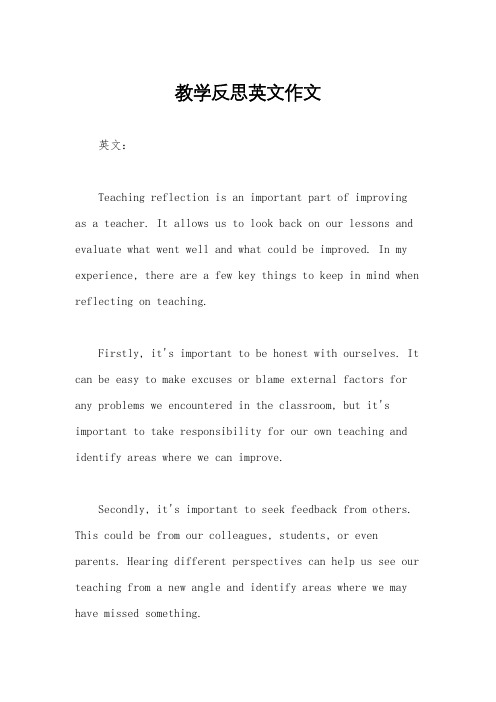
教学反思英文作文英文:Teaching reflection is an important part of improving as a teacher. It allows us to look back on our lessons and evaluate what went well and what could be improved. In my experience, there are a few key things to keep in mind when reflecting on teaching.Firstly, it's important to be honest with ourselves. It can be easy to make excuses or blame external factors for any problems we encountered in the classroom, but it's important to take responsibility for our own teaching and identify areas where we can improve.Secondly, it's important to seek feedback from others. This could be from our colleagues, students, or even parents. Hearing different perspectives can help us see our teaching from a new angle and identify areas where we may have missed something.Finally, it's important to take action based on our reflections. It's not enough to simply identify areas for improvement, we need to actively work on making changes to our teaching. This could involve attending professional development courses, trying out new teaching strategies, or seeking support from our colleagues.Overall, reflective practice is a crucial part of becoming a better teacher. By being honest with ourselves, seeking feedback, and taking action, we can continuously improve our teaching and provide the best possible learning experience for our students.中文:教学反思是提高教师能力的重要组成部分。
数学反思模板英语作文
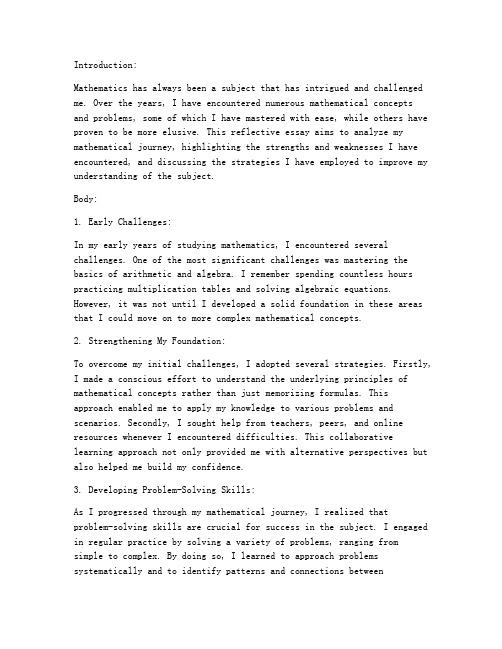
Introduction:Mathematics has always been a subject that has intrigued and challenged me. Over the years, I have encountered numerous mathematical conceptsand problems, some of which I have mastered with ease, while others have proven to be more elusive. This reflective essay aims to analyze my mathematical journey, highlighting the strengths and weaknesses I have encountered, and discussing the strategies I have employed to improve my understanding of the subject.Body:1. Early Challenges:In my early years of studying mathematics, I encountered several challenges. One of the most significant challenges was mastering the basics of arithmetic and algebra. I remember spending countless hours practicing multiplication tables and solving algebraic equations. However, it was not until I developed a solid foundation in these areas that I could move on to more complex mathematical concepts.2. Strengthening My Foundation:To overcome my initial challenges, I adopted several strategies. Firstly, I made a conscious effort to understand the underlying principles of mathematical concepts rather than just memorizing formulas. This approach enabled me to apply my knowledge to various problems and scenarios. Secondly, I sought help from teachers, peers, and online resources whenever I encountered difficulties. This collaborative learning approach not only provided me with alternative perspectives but also helped me build my confidence.3. Developing Problem-Solving Skills:As I progressed through my mathematical journey, I realized thatproblem-solving skills are crucial for success in the subject. I engaged in regular practice by solving a variety of problems, ranging fromsimple to complex. By doing so, I learned to approach problems systematically and to identify patterns and connections betweendifferent mathematical concepts. This skill has been invaluable in my academic and personal life.4. Embracing Technology:In recent years, technology has played a significant role in my mathematical development. I utilized various software and online toolsto visualize mathematical concepts and to solve problems moreefficiently. For instance, graphing calculators have helped me understand the behavior of functions and equations, while mathematical software has allowed me to explore more advanced topics.5. Recognizing My Weaknesses:Despite my progress, I have identified several weaknesses in my mathematical abilities. One of the primary weaknesses is my lack of proficiency in abstract thinking. Abstract mathematical concepts often pose a challenge for me, and I need to invest more time and effort in understanding their implications. Additionally, I sometimes strugglewith time management during exams, which hinders my ability to complete all questions accurately.6. Strategies for Improvement:To address my weaknesses, I plan to take the following steps. Firstly, I will focus on strengthening my abstract thinking skills by engaging in more challenging problems and exploring mathematical theories. Secondly, I will practice time management techniques during my study sessions and exams to ensure that I allocate sufficient time to each question. Lastly, I will continue to seek help from teachers and peers when I encounter difficulties, as collaboration is crucial for my growth.Conclusion:Reflecting on my mathematical journey has been an enlightening experience. I have come to appreciate the importance of perseverance, collaboration, and problem-solving skills in mastering mathematics.While I have achieved significant progress, I recognize that there isstill much to learn. By addressing my weaknesses and continuing todevelop my strengths, I am confident that I will continue to grow and excel in the field of mathematics.。
反思如何学好数学英语作文
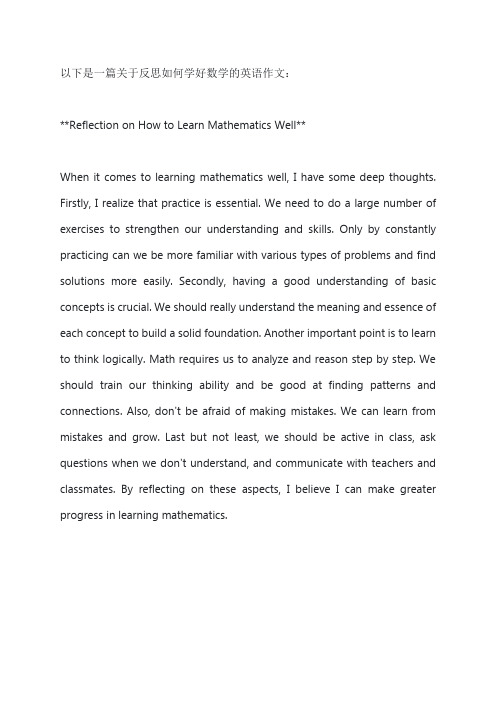
以下是一篇关于反思如何学好数学的英语作文:**Reflection on How to Learn Mathematics Well**When it comes to learning mathematics well, I have some deep thoughts. Firstly, I realize that practice is essential. We need to do a large number of exercises to strengthen our understanding and skills. Only by constantly practicing can we be more familiar with various types of problems and find solutions more easily. Secondly, having a good understanding of basic concepts is crucial. We should really understand the meaning and essence of each concept to build a solid foundation. Another important point is to learn to think logically. Math requires us to analyze and reason step by step. We should train our thinking ability and be good at finding patterns and connections. Also, don't be afraid of making mistakes. We can learn from mistakes and grow. Last but not least, we should be active in class, ask questions when we don't understand, and communicate with teachers and classmates. By reflecting on these aspects, I believe I can make greater progress in learning mathematics.。
数学反思作文英语模板
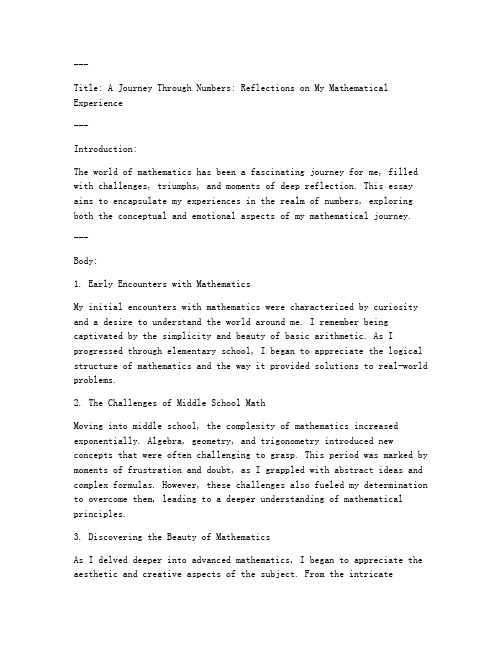
---Title: A Journey Through Numbers: Reflections on My Mathematical Experience---Introduction:The world of mathematics has been a fascinating journey for me, filled with challenges, triumphs, and moments of deep reflection. This essay aims to encapsulate my experiences in the realm of numbers, exploring both the conceptual and emotional aspects of my mathematical journey.---Body:1. Early Encounters with MathematicsMy initial encounters with mathematics were characterized by curiosity and a desire to understand the world around me. I remember being captivated by the simplicity and beauty of basic arithmetic. As I progressed through elementary school, I began to appreciate the logical structure of mathematics and the way it provided solutions to real-world problems.2. The Challenges of Middle School MathMoving into middle school, the complexity of mathematics increased exponentially. Algebra, geometry, and trigonometry introduced new concepts that were often challenging to grasp. This period was marked by moments of frustration and doubt, as I grappled with abstract ideas and complex formulas. However, these challenges also fueled my determination to overcome them, leading to a deeper understanding of mathematical principles.3. Discovering the Beauty of MathematicsAs I delved deeper into advanced mathematics, I began to appreciate the aesthetic and creative aspects of the subject. From the intricatepatterns of fractals to the elegant solutions of calculus, mathematics revealed its hidden beauty. This realization transformed my perspective, making me see mathematics not just as a tool for problem-solving, but as an art form that can inspire and awe.4. The Role of Mathematics in Problem-SolvingThroughout my mathematical journey, I have come to value the problem-solving skills that mathematics imparts. Whether it's finding the most efficient route to a destination or optimizing resources in a business setting, the logical and analytical thinking developed through mathematics has been invaluable. This has not only enriched my academic pursuits but also equipped me with practical skills for life beyond the classroom.5. The Emotional Aspect of MathematicsMathematics has also had a profound emotional impact on me. There have been moments of exhilaration when a particularly challenging problem was solved, and moments of despair when progress seemed impossible. These emotional ups and downs have taught me resilience and the importance of perseverance in the face of adversity.Conclusion:Reflecting on my mathematical journey, I am filled with a sense of gratitude and wonder. Mathematics has been a journey of discovery, one that has stretched my mind, tested my resolve, and ultimately enriched my life. As I continue to explore the vast landscape of numbers, I am excited about the future challenges and the lessons they will bring. Mathematics is not just a subject to me; it is a way of thinking, a source of inspiration, and a lifelong companion on my intellectual and personal journey.---This template provides a structured approach to writing a mathreflection essay, ensuring that you cover various aspects of yourmathematical experience while maintaining a coherent and engaging narrative.。
数学反思高中模板英语

As the saying goes, "Mathematics is the language of the universe." During my high school years, mathematics has been an indispensable subject in my academic journey. Through this subject, I have gained not only knowledge but also the ability to analyze and solve problems. This reflection aims to summarize my experiences, strengths, and weaknessesin high school mathematics.Firstly, I believe that one of my strengths in mathematics is my passion for the subject. Since I was young, I have always been fascinated by numbers and patterns. This passion has driven me to put in extra effort to understand complex mathematical concepts. Additionally, I have developed strong problem-solving skills through solving numerous mathematical problems. I have learned to break down complex problemsinto smaller, more manageable parts, which has greatly enhanced myability to find effective solutions.Another strength of mine is my perseverance. Mathematics is a subject that requires constant practice and dedication. I have always been willing to spend extra time studying and practicing problems. This perseverance has enabled me to overcome obstacles and achieve good grades in my math classes.However, I also recognize my weaknesses in mathematics. One of the main weaknesses is my lack of confidence in my ability to apply mathematical concepts to real-life situations. While I have a solid understanding of mathematical theories, I often struggle to apply them to solve real-world problems. This is mainly due to my fear of making mistakes and my tendency to overthink.Another weakness is my poor time management skills during math exams. Despite my preparation, I often find myself running out of time, which hinders my ability to solve all the problems correctly. This has taught me the importance of effective time management and the need to improve my test-taking skills.To address these weaknesses, I have taken several measures. Firstly, I have started to engage in more extracurricular activities related to mathematics, such as participating in math competitions and joining mathclubs. These activities have helped me to develop a deeper understanding of mathematical concepts and apply them to real-life situations.Secondly, I have improved my time management skills by practicing timed math problems and setting specific goals for each section of the exam. This has helped me to become more efficient in solving problems and better manage my time during exams.Lastly, I have learned to embrace mistakes as a part of the learning process. By acknowledging that making mistakes is a natural part of learning, I have become more willing to take risks and explore different solutions.In conclusion, my high school mathematics experience has been both challenging and rewarding. Through this subject, I have gained a deeper understanding of the world around me and developed valuable problem-solving skills. While I have strengths and weaknesses, I am committed to continuous improvement and growth in mathematics. I believe that by addressing my weaknesses and building upon my strengths, I will be able to excel in mathematics and achieve my academic goals.。
语文数学英语的反思作文
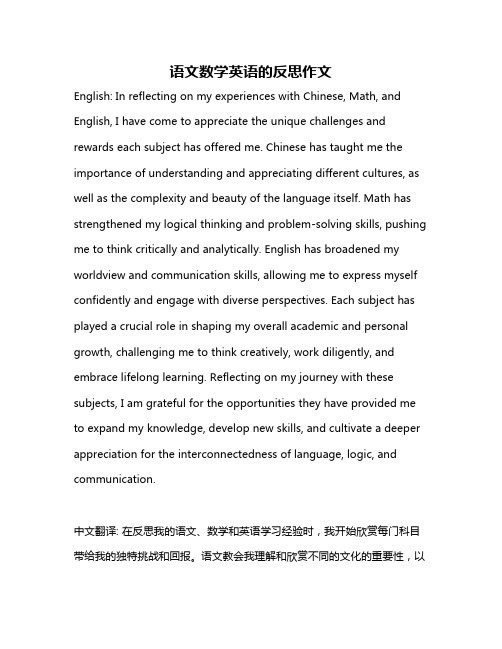
语文数学英语的反思作文English: In reflecting on my experiences with Chinese, Math, and English, I have come to appreciate the unique challenges and rewards each subject has offered me. Chinese has taught me the importance of understanding and appreciating different cultures, as well as the complexity and beauty of the language itself. Math has strengthened my logical thinking and problem-solving skills, pushing me to think critically and analytically. English has broadened my worldview and communication skills, allowing me to express myself confidently and engage with diverse perspectives. Each subject has played a crucial role in shaping my overall academic and personal growth, challenging me to think creatively, work diligently, and embrace lifelong learning. Reflecting on my journey with these subjects, I am grateful for the opportunities they have provided me to expand my knowledge, develop new skills, and cultivate a deeper appreciation for the interconnectedness of language, logic, and communication.中文翻译: 在反思我的语文、数学和英语学习经验时,我开始欣赏每门科目带给我的独特挑战和回报。
数学反思模板英语初一
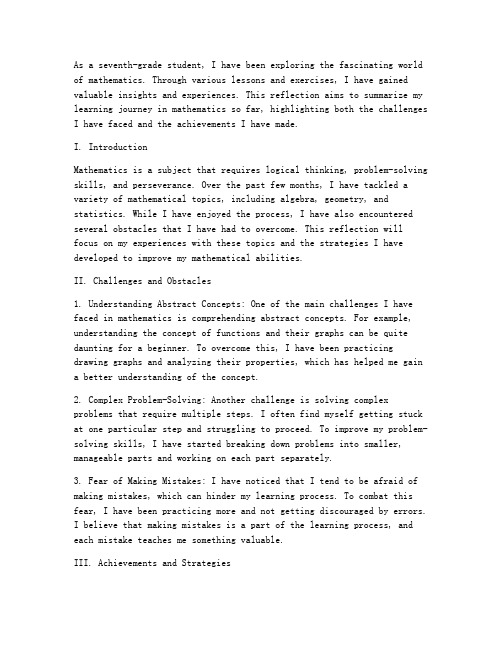
As a seventh-grade student, I have been exploring the fascinating world of mathematics. Through various lessons and exercises, I have gained valuable insights and experiences. This reflection aims to summarize my learning journey in mathematics so far, highlighting both the challenges I have faced and the achievements I have made.I. IntroductionMathematics is a subject that requires logical thinking, problem-solving skills, and perseverance. Over the past few months, I have tackled a variety of mathematical topics, including algebra, geometry, and statistics. While I have enjoyed the process, I have also encountered several obstacles that I have had to overcome. This reflection will focus on my experiences with these topics and the strategies I have developed to improve my mathematical abilities.II. Challenges and Obstacles1. Understanding Abstract Concepts: One of the main challenges I have faced in mathematics is comprehending abstract concepts. For example, understanding the concept of functions and their graphs can be quite daunting for a beginner. To overcome this, I have been practicing drawing graphs and analyzing their properties, which has helped me gain a better understanding of the concept.2. Complex Problem-Solving: Another challenge is solving complex problems that require multiple steps. I often find myself getting stuck at one particular step and struggling to proceed. To improve my problem-solving skills, I have started breaking down problems into smaller, manageable parts and working on each part separately.3. Fear of Making Mistakes: I have noticed that I tend to be afraid of making mistakes, which can hinder my learning process. To combat this fear, I have been practicing more and not getting discouraged by errors.I believe that making mistakes is a part of the learning process, and each mistake teaches me something valuable.III. Achievements and Strategies1. Consistent Practice: One of the key factors that have contributed to my progress in mathematics is consistent practice. By dedicating time each day to work on mathematical problems, I have been able to improve my skills gradually.2. Seeking Help: When I encounter a problem that I cannot solve on my own, I have learned to seek help from teachers, classmates, or online resources. This has helped me overcome obstacles and gain new insights.3. Developing a Growth Mindset: Adopting a growth mindset has been instrumental in my mathematical journey. I have come to understand that intelligence is not fixed, and with hard work and dedication, I can improve my mathematical abilities.IV. Future GoalsLooking ahead, I have set several goals to further enhance my mathematical skills:1. Mastering Advanced Topics: I aim to master more advanced mathematical topics, such as trigonometry and calculus, to broaden my understanding of mathematics.2. Improving Problem-Solving Skills: I plan to continue practicing problem-solving techniques to become more proficient in tackling complex problems.3. Participating in Math Competitions: To challenge myself further, I aspire to participate in math competitions and learn from other talented students.V. ConclusionMathematics has been a journey filled with challenges and rewards. Through consistent effort, seeking help, and adopting a growth mindset, I have made significant progress in my mathematical abilities. As I continue to explore the world of mathematics, I am excited about the opportunities that lie ahead and the new skills I will acquire.。
数学反思模板英语
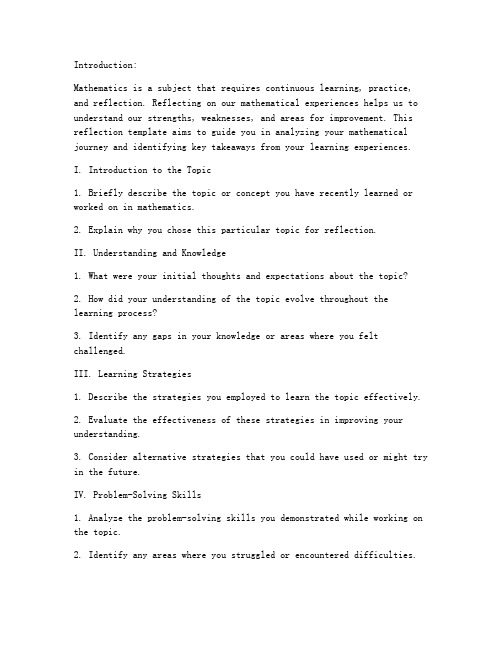
Introduction:Mathematics is a subject that requires continuous learning, practice, and reflection. Reflecting on our mathematical experiences helps us to understand our strengths, weaknesses, and areas for improvement. This reflection template aims to guide you in analyzing your mathematical journey and identifying key takeaways from your learning experiences.I. Introduction to the Topic1. Briefly describe the topic or concept you have recently learned or worked on in mathematics.2. Explain why you chose this particular topic for reflection.II. Understanding and Knowledge1. What were your initial thoughts and expectations about the topic?2. How did your understanding of the topic evolve throughout the learning process?3. Identify any gaps in your knowledge or areas where you felt challenged.III. Learning Strategies1. Describe the strategies you employed to learn the topic effectively.2. Evaluate the effectiveness of these strategies in improving your understanding.3. Consider alternative strategies that you could have used or might try in the future.IV. Problem-Solving Skills1. Analyze the problem-solving skills you demonstrated while working on the topic.2. Identify any areas where you struggled or encountered difficulties.3. Reflect on the techniques or tools you used to overcome challenges and solve problems.V. Collaboration and Communication1. Assess your ability to work collaboratively with peers on mathematical tasks.2. Reflect on the communication skills you demonstrated during group discussions or presentations.3. Identify areas for improvement in your collaboration and communication skills.VI. Mistakes and Learning from Them1. Acknowledge any mistakes or misconceptions you made while learning the topic.2. Analyze the reasons behind these mistakes and how they affected your understanding.3. Discuss the lessons you learned from these mistakes and how they have influenced your future learning.VII. Application of Knowledge1. Describe real-life situations or examples where you have applied the knowledge gained from the topic.2. Reflect on the impact of your mathematical skills in these situations.3. Identify opportunities for further application of your knowledge in different contexts.VIII. Future Goals and Plans1. Set specific goals for your future mathematical learning and development.2. Outline a plan to achieve these goals, including resources, study habits, and additional support if needed.3. Reflect on the importance of continuous learning and improvement in mathematics.Conclusion:In conclusion, this reflection template has provided you with a structured approach to analyzing your mathematical journey. Byreflecting on your understanding, learning strategies, problem-solving skills, collaboration, mistakes, and future goals, you can gain valuable insights into your mathematical abilities and areas for growth. Remember that reflection is a continuous process, and by regularly evaluating your learning experiences, you can enhance your mathematical proficiency and achieve greater success in the subject.。
数学反思作文英语版本
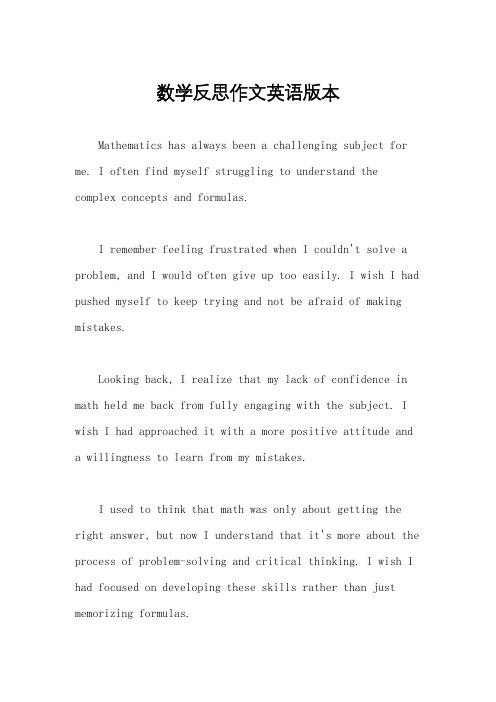
数学反思作文英语版本Mathematics has always been a challenging subject for me. I often find myself struggling to understand the complex concepts and formulas.I remember feeling frustrated when I couldn't solve a problem, and I would often give up too easily. I wish I had pushed myself to keep trying and not be afraid of making mistakes.Looking back, I realize that my lack of confidence in math held me back from fully engaging with the subject. I wish I had approached it with a more positive attitude and a willingness to learn from my mistakes.I used to think that math was only about getting the right answer, but now I understand that it's more about the process of problem-solving and critical thinking. I wish I had focused on developing these skills rather than just memorizing formulas.Mathematics has taught me the importance of perseverance and resilience. I have learned that it's okay to struggle and that making mistakes is a natural part of the learning process.I now see math as a tool for understanding the world around me. It's not just about numbers and equations, but about logic, patterns, and reasoning. I wish I had realized this earlier and approached math with a more open mind.In the end, I am grateful for the struggles I faced with math. They have taught me valuable lessons about determination, growth, and the importance of facing challenges head-on. Math may still be difficult for me, but I now have a newfound appreciation for the subject and the skills it has helped me develop.。
反思数学作文英语模板
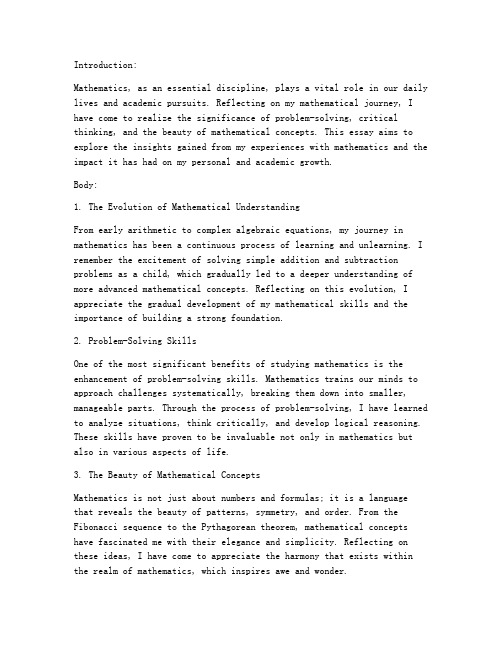
Introduction:Mathematics, as an essential discipline, plays a vital role in our daily lives and academic pursuits. Reflecting on my mathematical journey, I have come to realize the significance of problem-solving, critical thinking, and the beauty of mathematical concepts. This essay aims to explore the insights gained from my experiences with mathematics and the impact it has had on my personal and academic growth.Body:1. The Evolution of Mathematical UnderstandingFrom early arithmetic to complex algebraic equations, my journey in mathematics has been a continuous process of learning and unlearning. I remember the excitement of solving simple addition and subtraction problems as a child, which gradually led to a deeper understanding of more advanced mathematical concepts. Reflecting on this evolution, I appreciate the gradual development of my mathematical skills and the importance of building a strong foundation.2. Problem-Solving SkillsOne of the most significant benefits of studying mathematics is the enhancement of problem-solving skills. Mathematics trains our minds to approach challenges systematically, breaking them down into smaller, manageable parts. Through the process of problem-solving, I have learned to analyze situations, think critically, and develop logical reasoning. These skills have proven to be invaluable not only in mathematics but also in various aspects of life.3. The Beauty of Mathematical ConceptsMathematics is not just about numbers and formulas; it is a languagethat reveals the beauty of patterns, symmetry, and order. From the Fibonacci sequence to the Pythagorean theorem, mathematical concepts have fascinated me with their elegance and simplicity. Reflecting on these ideas, I have come to appreciate the harmony that exists within the realm of mathematics, which inspires awe and wonder.4. The Role of Mathematics in Academic PursuitsMathematics has played a crucial role in my academic journey. It has equipped me with the necessary tools to excel in various subjects, such as physics, engineering, and computer science. Moreover, mathematics has helped me develop a mindset that encourages continuous learning and exploration. Reflecting on this aspect, I acknowledge the importance of mathematics in fostering a well-rounded education.5. The Challenges and Rewards of MathematicsWhile mathematics is a subject that brings immense satisfaction, it also presents its fair share of challenges. The complexity of certain mathematical concepts, the pressure to perform, and the need for perseverance can be daunting. However, overcoming these challenges has taught me resilience and the value of hard work. The rewards of mathematical success, such as the satisfaction of solving a difficult problem or the appreciation of a beautiful mathematical theorem, are worth the effort.Conclusion:In conclusion, reflecting on my experiences with mathematics has allowed me to appreciate the importance of this discipline in my personal and academic growth. Mathematics has not only enhanced my problem-solving skills and critical thinking but also exposed me to the beauty of mathematical concepts. As I continue my journey in mathematics, I am determined to embrace the challenges and rewards that lie ahead, and to further develop my understanding of this fascinating subject.。
反思数学作文模板英语
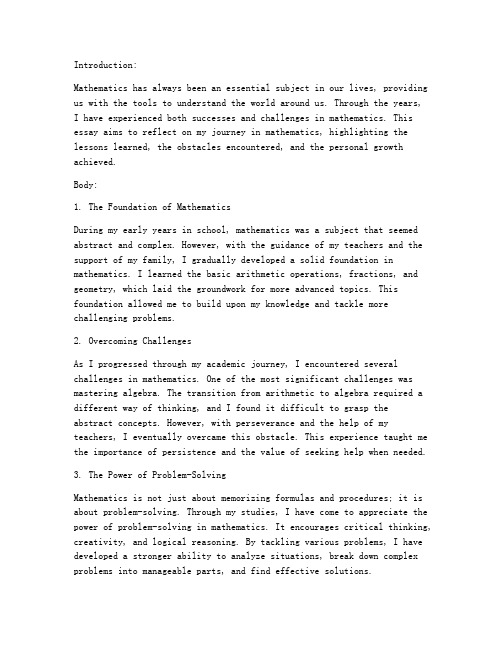
Introduction:Mathematics has always been an essential subject in our lives, providing us with the tools to understand the world around us. Through the years, I have experienced both successes and challenges in mathematics. This essay aims to reflect on my journey in mathematics, highlighting the lessons learned, the obstacles encountered, and the personal growth achieved.Body:1. The Foundation of MathematicsDuring my early years in school, mathematics was a subject that seemed abstract and complex. However, with the guidance of my teachers and the support of my family, I gradually developed a solid foundation in mathematics. I learned the basic arithmetic operations, fractions, and geometry, which laid the groundwork for more advanced topics. This foundation allowed me to build upon my knowledge and tackle more challenging problems.2. Overcoming ChallengesAs I progressed through my academic journey, I encountered several challenges in mathematics. One of the most significant challenges was mastering algebra. The transition from arithmetic to algebra required a different way of thinking, and I found it difficult to grasp theabstract concepts. However, with perseverance and the help of my teachers, I eventually overcame this obstacle. This experience taught me the importance of persistence and the value of seeking help when needed.3. The Power of Problem-SolvingMathematics is not just about memorizing formulas and procedures; it is about problem-solving. Through my studies, I have come to appreciate the power of problem-solving in mathematics. It encourages critical thinking, creativity, and logical reasoning. By tackling various problems, I have developed a stronger ability to analyze situations, break down complex problems into manageable parts, and find effective solutions.4. The Beauty of MathematicsOne of the most remarkable aspects of mathematics is its beauty. From the elegant symmetry of fractals to the intricate patterns found in nature, mathematics is a language that describes the wonders of our universe. Exploring mathematics has allowed me to appreciate its beauty and the beauty of the world around me.5. Personal GrowthMy journey in mathematics has not only equipped me with valuable skills but also contributed to my personal growth. It has taught me the importance of patience, discipline, and determination. The process of learning mathematics has been a journey of self-discovery, where I have learned to embrace challenges, overcome obstacles, and celebrate my successes.Conclusion:In conclusion, mathematics has played a significant role in my life, shaping my skills, knowledge, and personal growth. Through the years, I have learned to appreciate the beauty of mathematics, overcome challenges, and develop problem-solving skills. As I continue to explore the world of mathematics, I am confident that it will continue to enrich my life and contribute to my future endeavors.。
数学英语检讨范文300字
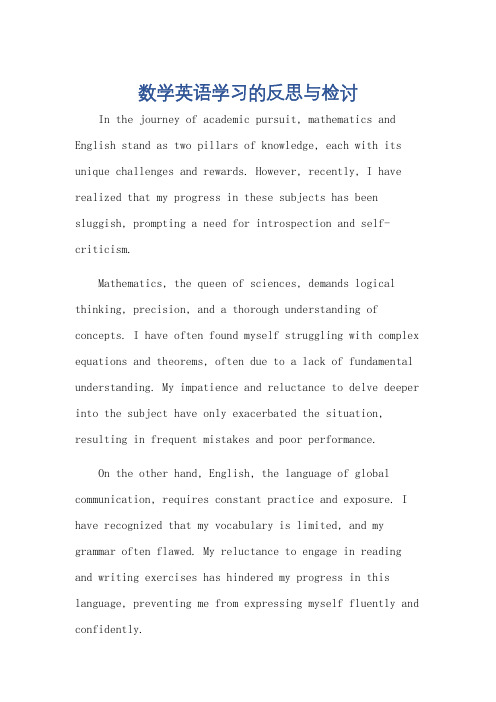
数学英语学习的反思与检讨In the journey of academic pursuit, mathematics and English stand as two pillars of knowledge, each with its unique challenges and rewards. However, recently, I have realized that my progress in these subjects has been sluggish, prompting a need for introspection and self-criticism.Mathematics, the queen of sciences, demands logical thinking, precision, and a thorough understanding of concepts. I have often found myself struggling with complex equations and theorems, often due to a lack of fundamental understanding. My impatience and reluctance to delve deeper into the subject have only exacerbated the situation, resulting in frequent mistakes and poor performance.On the other hand, English, the language of global communication, requires constant practice and exposure. I have recognized that my vocabulary is limited, and my grammar often flawed. My reluctance to engage in reading and writing exercises has hindered my progress in this language, preventing me from expressing myself fluently and confidently.To address these issues, I must adopt a different approach. For mathematics, I need to cultivate a mindset of curiosity and exploration, delving into the underlying principles and applying them to practical problems. For English, regular practice is key. I must make a conscious effort to read more, write more, and speak more in this language, gradually expanding my vocabulary and honing my grammar skills.In conclusion, while mathematics and English present unique challenges, they also offer immense opportunitiesfor growth and learning. My journey ahead is filled with potential, but only if I am willing to embrace the challenges and put in the necessary effort. I am committed to making the necessary changes and improving my performance in these subjects,坚信通过不懈的努力,我能够在数学和英语的学习上取得更大的进步。
教学反思作文英语模板
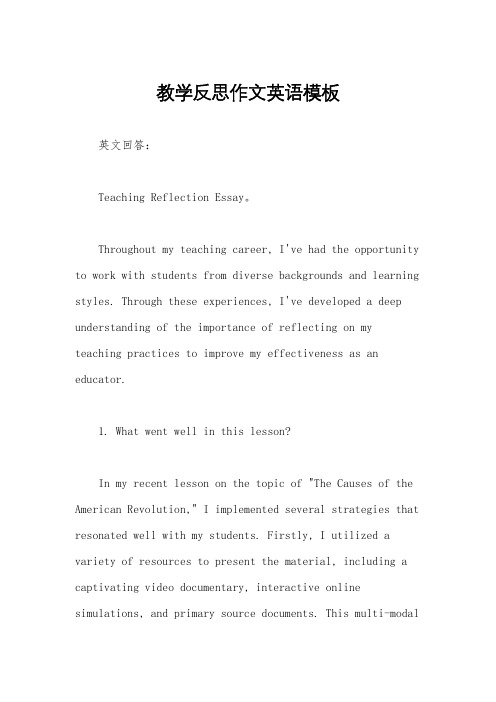
教学反思作文英语模板英文回答:Teaching Reflection Essay。
Throughout my teaching career, I've had the opportunity to work with students from diverse backgrounds and learning styles. Through these experiences, I've developed a deep understanding of the importance of reflecting on my teaching practices to improve my effectiveness as an educator.1. What went well in this lesson?In my recent lesson on the topic of "The Causes of the American Revolution," I implemented several strategies that resonated well with my students. Firstly, I utilized a variety of resources to present the material, including a captivating video documentary, interactive online simulations, and primary source documents. This multi-modalapproach accommodated different learning preferences and kept the students engaged.2. What could have been improved?Despite the positive aspects of the lesson, Iidentified areas where I could have made improvements. The timing of the lesson was not optimal. It was scheduled towards the end of the day, when students were understandably more fatigued. By adjusting the lesson's placement in the schedule, I could have enhanced student attention and participation.3. What will I do differently next time?To improve upon the effectiveness of future lessons,I've resolved to incorporate the following changes:Flexible Pacing: I'll allocate more time to key concepts and adjust the pace of the lesson based on student feedback and engagement levels.Differentiated Instruction: I'll cater to diverse learning styles by providing differentiated assignments and activities, ensuring that all students have opportunities for success.Regular Assessment: I'll integrate formative assessment techniques throughout the lesson to monitor student understanding and make timely adjustments to my teaching strategies.4. What did I learn from this experience?This teaching experience has reinforced the value of ongoing reflection. By analyzing my practices, I've gained valuable insights into my strengths and weaknesses as an educator. This knowledge empowers me to continually refine my teaching methods and create a more engaging andeffective learning environment for my students.5. How can I use this experience to improve my teaching in the future?The lessons learned from this experience will serve as a roadmap for my future teaching endeavors. I intend to:Incorporate Best Practices: I'll implement evidence-based teaching strategies that have proven effective in engaging students and promoting learning.Seek Feedback Regularly: I'll actively solicit feedback from students, colleagues, and administrators to gain diverse perspectives and identify areas for improvement.Stay Up-to-Date on Research: I'll continue to stay abreast of the latest educational research and trends to ensure that my teaching is informed by the most current knowledge.中文回答:教学反思作文。
教学反思英文作文模板
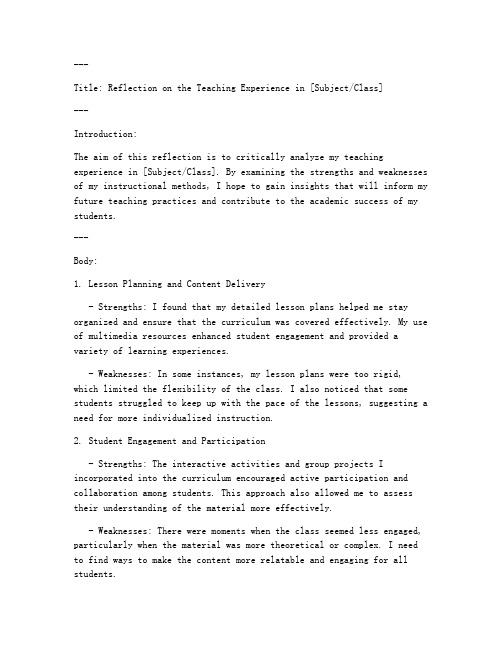
---Title: Reflection on the Teaching Experience in [Subject/Class]---Introduction:The aim of this reflection is to critically analyze my teaching experience in [Subject/Class]. By examining the strengths and weaknesses of my instructional methods, I hope to gain insights that will inform my future teaching practices and contribute to the academic success of my students.---Body:1. Lesson Planning and Content Delivery- Strengths: I found that my detailed lesson plans helped me stay organized and ensure that the curriculum was covered effectively. My use of multimedia resources enhanced student engagement and provided a variety of learning experiences.- Weaknesses: In some instances, my lesson plans were too rigid, which limited the flexibility of the class. I also noticed that some students struggled to keep up with the pace of the lessons, suggesting a need for more individualized instruction.2. Student Engagement and Participation- Strengths: The interactive activities and group projects I incorporated into the curriculum encouraged active participation and collaboration among students. This approach also allowed me to assess their understanding of the material more effectively.- Weaknesses: There were moments when the class seemed less engaged, particularly when the material was more theoretical or complex. I need to find ways to make the content more relatable and engaging for all students.3. Assessment and Feedback- Strengths: I provided regular formative assessments, such asquizzes and class discussions, which helped me monitor student progress and address any misconceptions early on. My feedback was constructiveand aimed at promoting student growth.- Weaknesses: I sometimes found it challenging to providepersonalized feedback to each student due to time constraints. Additionally, the summative assessments, like exams, may have placed too much emphasis on rote learning rather than critical thinking.4. Classroom Management- Strengths: I maintained a positive and respectful classroom environment, which fostered a sense of safety and trust among students. My consistent enforcement of classroom rules helped maintain order.- Weaknesses: There were instances where I was too lenient with discipline, which resulted in decreased focus and increased distractions.I need to be more proactive in addressing behavioral issues before they escalate.5. Professional Development- Strengths: I actively sought out professional development opportunities, such as workshops and webinars, to enhance my teaching skills and stay updated with current educational trends.- Weaknesses: I need to allocate more time for reflective practices and self-assessment to better understand my teaching effectiveness and identify areas for improvement.---Conclusion:Reflecting on my teaching experience has been an invaluable process. It has highlighted the areas where I excel and the areas that requirefurther development. By addressing the weaknesses identified in this reflection, I am confident that I can improve my teaching practices andbetter serve my students. Continuous self-assessment and a commitment to professional growth will undoubtedly contribute to my success as an educator.---Note: This template can be customized to fit specific teaching experiences, subjects, and learning outcomes. It is important to provide concrete examples and personal insights throughout the reflection to create a comprehensive and authentic account of the teaching experience.。
教学反思英文版简短

教学反思英文版简短Title: Reflection on Teaching (English Version)Teaching is an art that requires continuous reflection and improvement. As an educator, it is essential to critically analyze lessons and consider ways to enhance the learning experience for students. In this reflection, I would like to share my thoughts on a recent teaching experience and the strategies I plan to implement for future lessons.One aspect that stood out during my teaching was the need for better time management. I realized that I often underestimated the amount of time certain activities would take, resulting in rushed explanations or incomplete discussions. To address this issue, I plan to create a detailed lesson plan that includes estimated time for each activity. This will help me allocate sufficient time to cover the content effectively and allow for meaningful student interactions.Additionally, I noticed that some students struggled to grasp certain concepts. I realized that my explanations were sometimes unclear or overly complex, leading to confusion. To improve clarity, I aim to incorporate more visuals, real-life examples, and analogies in my teaching. These strategies can help students relate abstract concepts to their everydaylives, making the learning process more engaging and comprehensible.Another area that requires attention is student engagement. Although I strive to create an inclusive and interactive classroom environment, I noticed a few students who appeared disengaged during lessons. To address this, I plan to incorporate more group activities, discussions, and hands-on learning experiences. By providing opportunities for collaboration and active participation, I hope to foster a sense of ownership and enthusiasm among all students.Furthermore, feedback plays a crucial role in promoting student growth. While I provided feedback on assignments and assessments, I realized the need for more frequent and immediate feedback. To address this, I plan to implement regular formative assessments and quick check-ins during class. This will allow me to identify areas of improvement for students and provide timely feedback to guide their learning effectively.In conclusion, reflecting on my teaching experience has highlighted the importance of time management, clarity in explanations, student engagement, and frequent feedback. By implementing the strategies discussed, I aim to create a more effective and inclusive learning environment. Reflecting on our teaching practices is an ongoing process,and I am committed to continuously improving as an educator to better serve my students.。
数学反思模板英语小学
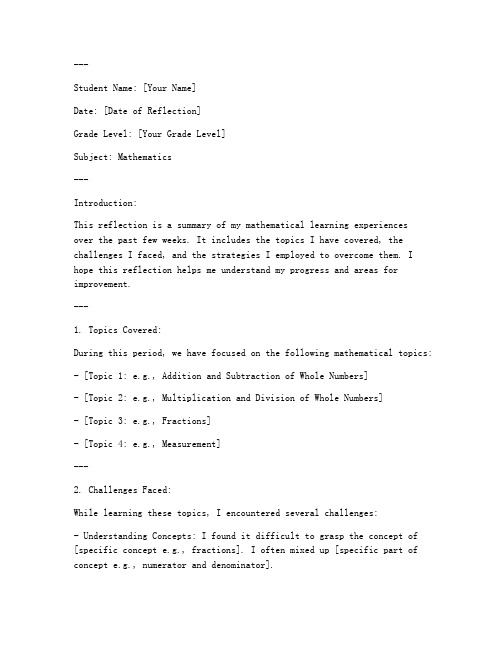
---Student Name: [Your Name]Date: [Date of Reflection]Grade Level: [Your Grade Level]Subject: Mathematics---Introduction:This reflection is a summary of my mathematical learning experiences over the past few weeks. It includes the topics I have covered, the challenges I faced, and the strategies I employed to overcome them. I hope this reflection helps me understand my progress and areas for improvement.---1. Topics Covered:During this period, we have focused on the following mathematical topics:- [Topic 1: e.g., Addition and Subtraction of Whole Numbers]- [Topic 2: e.g., Multiplication and Division of Whole Numbers]- [Topic 3: e.g., Fractions]- [Topic 4: e.g., Measurement]---2. Challenges Faced:While learning these topics, I encountered several challenges:- Understanding Concepts: I found it difficult to grasp the concept of [specific concept e.g., fractions]. I often mixed up [specific part of concept e.g., numerator and denominator].- Practical Application: Applying the learned concepts to real-life situations was a challenge. For instance, I struggled with converting [specific concept e.g., fractions] into percentages.- Speed and Accuracy: Sometimes, I found myself rushing through the problems, leading to mistakes. I realized that I need to take my time to ensure accuracy.---3. Strategies Employed:To overcome these challenges, I have tried the following strategies:- Practice Regularly: I have been practicing problems related to [specific topic e.g., fractions] daily to improve my understanding.- Use Visual Aids: I have started using diagrams and charts to visualize the concepts, which has helped me understand them better.- Seek Help: Whenever I was stuck, I didn't hesitate to ask my teacher or classmates for help. This has been very beneficial in clearing my doubts.- Review Old Concepts: I realized that many new concepts are built upon old ones. So, I have been revisiting the previous topics to strengthen my foundation.---4. Progress and Learning:I believe I have made significant progress in the following areas:- Conceptual Understanding: I now have a clearer understanding of [specific concept e.g., fractions], and I can explain it to others.- Problem-Solving Skills: My problem-solving skills have improved, and I can now apply the learned concepts to solve more complex problems.- Accuracy: I have become more accurate in my calculations, and I no longer rush through the problems.---5. Areas for Improvement:Despite the progress, there are still areas where I need to improve:- Consistency: I need to be more consistent in my practice and not miss any days.- Deepening Understanding: I should continue to explore the various aspects of the concepts to deepen my understanding.- Time Management: I need to manage my time better during exams and quizzes to ensure I have enough time to solve all the problems.---Conclusion:Reflecting on my mathematical journey has been insightful. I have identified my strengths and weaknesses, and I am confident that with continued effort and the right strategies, I can overcome the challenges and achieve my goals. I look forward to the upcoming lessons and the opportunities they will provide for me to grow as a math learner.---Signature: [Your Signature]Teacher's Comments: [Teacher's Signature and Feedback]。
- 1、下载文档前请自行甄别文档内容的完整性,平台不提供额外的编辑、内容补充、找答案等附加服务。
- 2、"仅部分预览"的文档,不可在线预览部分如存在完整性等问题,可反馈申请退款(可完整预览的文档不适用该条件!)。
- 3、如文档侵犯您的权益,请联系客服反馈,我们会尽快为您处理(人工客服工作时间:9:00-18:30)。
Look at this elephant教学反思
李晶
回顾这节课的教学过程,有优点也有不足,经过认真反思,现总结如下:
一、本节课优点在于:
1、老师能利用生动形象地肢体语言讲解新词,并教学生正确读出各词的发音。
2、单词以卡片形式逐词学习并将相应汉意展示给学生,这样更直观一些,学生理解掌握起来比较容易。
3、能充分发现并培养发音好的学生,使他们充当“小老师”,通过学生教学生,即减轻了老师的负担,又调动了部分学生的积极性,同时也解决了某些学生的疑问,可谓“一举数得”。
4、读课文形式多种多样,通过组与组间,男女生间,个别学生间分读课文,避免了单一枯燥的死读课文,同时也激发了学生的学习兴趣。
二、本课不足之处在于:
1、对于strong的发音,学生把握得不是很好,把它拆开来教效果可能会更好。
2、本课要求学生用big,small,beautiful,strong,funny描述自己周围人或物时,有一定局限性,还可启发学生涉及到自己的日常学习用品。
三、通过本节课教学活动我也有几处迷惘:
1、课堂气氛放开后,该如何收场?
2、对于学生争相举手回答问题的活跃场面,在满足不了学生表现欲的情况下,怎样才不打击他们的积极性呢?
这些都有待于在以后的教学中,不断摸索,不断创新。
小数乘整数------教学反思
李晶
本节课也是在整数乘以整数计算方法的基础上,通过小组讨论汇报,使学生明白计算小数乘以整数,是把小数转化成整数计算的,这样师生共同归纳总结出小数乘法的计算法则,同时培养学生合作探究的能力.
小数乘整数是小数乘法这一单元的起始课,在数与计算中具有承上启下的作用,本节课由于小数乘法和整数乘法之间有着十分密切的联系,因此要紧紧抓住这种联系.帮助学生将未知转化成已知,逐步渗透了转化的思想,在教学0.72×5时,教师提出了"你能将它转化成已经学过的乘法算式吗"引导学生经历将未知转化成已知的学习过程,同时获得用转化的思想方法去探究新知的本领.
在本节课的学习过程中,学生感到困难的并不是小数乘整数的计算方法,而是对算理的理解和表述,因此,教师要给学生提供充分思考,交流的机会,引导学生对计算过程作出合理的解释.比如:教学
3.5×3时,有的学生想到了用35×3,教师要启发学生为什么可以这样算,引导学生用简洁的语言概括:先把3.5元转化成35角,再计算35角×3,最后将结果105角转化成10.5元,再比如教学0.72×5时,学生提出问题:3.60为什么可以写成3.6 ,360的小数点为什么要向左移动两位通过交流,培养了学生的推理能力.
作文教学反思
李晶
教学生写作文不仅要教给学生的写作文法,还要教给学生评改作文的本领。
培养自改作文的习惯是培养自改能力的基础。
评改作文能力的训练不是到高年级才进行的,在中年级的作文包括片断练习,低年级的说话、造句与写话训练中都可以进行训练。
只有历练到成了习惯,才能在“落笔”之前勤于思考,“成文”之后反复推敲。
如此习惯一旦形成,将会终身受用。
1、师生共同评改
师生共同评改就是师生一起讨论,一起评改一篇文章。
课前选一些具有代表性的作文印发给学生,让他们阅读思考,作好修改准备。
接着教师根据上述“四读评改法”进行指导,以学生的发言为主,教师作适当启发、点拨,充分发挥集体智慧,让学生动脑筋发现错误,指出评改原因,使他们从病例分析中懂得错在哪里,为什么错,如何修改。
也可以让学生再挑阅其他习作,从中找出所犯的相同毛病进行修改以加深印象。
2、学生相互评改
学生喜欢评改别人的文章,但往往又无从着手。
开始学习评改时,教师首先根据习作的要求,从字词句点到篇章结构,立意,突出侧重点拟出几个具体标准,出示在黑板上作为修改的尺度。
其次要求学生使用统一的修改符号,标出文章的错处。
起先可以组成几个评改小组,让他们以小组为单位进行集体评改,因为学生独自一个修改一篇文章显然有一定的难度,只有让不同作文水平的学生组成一个小组评改作为今后自我评改的铺垫、过渡。
学生相互评改时允许他们挑选评改对象,让他们接触各种同学的文章,吸取各方优点,相互学习,取长补短。
3、学生自我评改
经过一段时期的训练,学生对作文评改已有了初步的印象。
当学生写好文章之后,最好念上一两遍,在读的过程中,检查中心观点,检查段落层次,检查字词句点等。
然后拿起笔来进行修改自己觉得不妥的地方。
改了读,读了改,反反复复地修改,直至念起来上口,听起来顺耳。
同时,还应敢于将自己的作文“曝光”,读给同学听,读给家人听,请他们多提意见,这样集思广益会收效更大。
《用字母表示数》教学反思
李晶
教学是一门遗憾的艺术,每次上过课后,我总有或多或少的感慨与反思。
针对自己《用字母表示数》的教学,谈一谈自己的反思。
《用字母表示数》是学习代数知识的重要内容,是小学生们由具体的数过渡到用字母表示数,在认识上的一次飞跃。
对我们五年级孩子来说,本课内容较为抽象与枯燥,教学有一定难度。
我认真思考了课程标准中关于字母表示数部分的目标要求,注意到在原有知识技能的掌握应用要求上,怎样“注重、强调让学生充分体验和经历用字母表示数的过程”十分重要。
所以我设计了试图让学生充分经历用字母表示数的过程的教学环节。
1、课的一开始,我试图用生活中的大量含有字母的例子引入《用字母表示数》教学反思下面的课题。
但从实际的教学过程来看,似乎效果不是很理想。
我课后反思、总结,发现这些例子虽然在表面上联系了生活,但并没有什么实际的数学元素与内涵,没有为下面的学习作好知识上的联系。
2、字母简写的过程,知识点相当多。
很多地方并没有开展探究的价值。
在试教时我采用“自学”方式,但学生普遍理解有困难。
因此,在教学方式选择上,部分环节我选择了以老师讲授为主,让学生通过有意义的接受来巩固认知,节约了教学的时间资源,优化了教学程序。
但在具体处理时,个人认为还可以更讲究教学层次,更精当些。
纵观全课,还有很多不足之处,在今后教学中应多注意,为再次教学打好基础。
